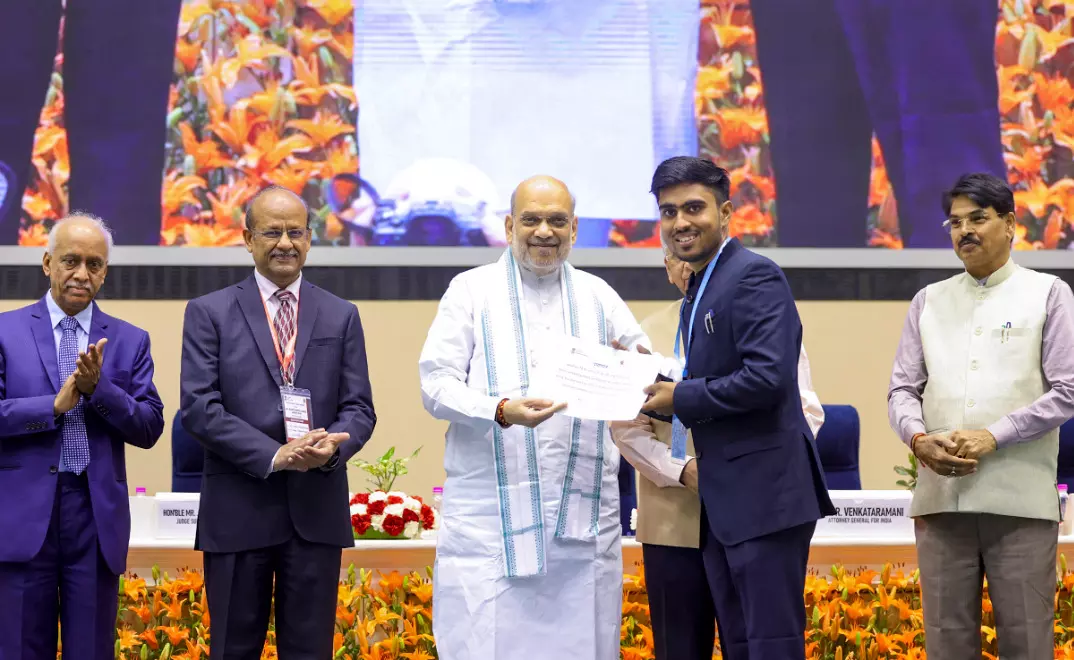Importance of forensic science increased manifold with crime becoming borderless: Amit Shah

New Delhi: The importance of forensic science has increased manifold with crime becoming borderless and criminals often breaching the boundaries of states and countries, Union Home Minister Amit Shah said on Monday, highlighting how the Modi government has made forensic science a part of the criminal justice system.
The government is also working to ensure that people get justice in time and to their satisfaction, Shah said while addressing the All-India Forensic Science Summit 2025 organised by the National Forensic Sciences University (NFSU) here.
"Under the leadership of Prime Minister Narendra Modi, the government is striving to make the criminal justice system people-centric and scientific. The government is also working to ensure that the person seeking justice gets it in time and also gets the satisfaction of getting justice," Shah said.
Calling forensic science very useful to strengthen the country's criminal justice system, the home minister said, "Prime Minister Modi's vision has changed the landscape of the criminal justice system in the country. We have made forensic science a part of the criminal justice system so that justice is not only delivered and the guilty is punished, but at the same time ensuring that no innocent suffers."
Shah also said the summit will prove to be very useful in bringing experts on one platform, discussing policies, formulating and shaping future strategies and finding a unanimously accepted solution.
"In today's time, if we have to provide timely justice and increase the conviction rate, it won't be possible without forensic science," he said.
There was a time when crime used to be limited to the boundaries of districts, states and countries, but it has become borderless now, he said.
"In such a situation, the importance of forensic science increases manifold," the home minister said.
He also said there should be no injustice done either to the accused or the complainant.
"If we want to ensure this, we will have to make forensic science a part of the criminal justice system," Shah said.
The two initiatives of establishing the forensic science university in 2009 and 2020 were taken under the leadership of Modi, first as the chief minister of Gujarat and then as the prime minister of the country, he said.
It has not only provided the country with trained manpower, but has also "opened our doors for research in many fields", Shah said.
The home minister said as per the new criminal laws, forensic team's visit is mandatory in cases that entail punishment of up to seven years.
"Prime Minister Modi works with a vision. The new criminal laws came into effect in 2024, but the National Forensic Science University was established in 2020. It has seven campuses in different states while nine new campuses will be established in the next six months," he said.
Paying tributes to B R Ambedkar on his 135th birth anniversary, Shah said Babasaheb framed the Constitution keeping in mind the traditions and needs of the country "so that it remains relevant for the next 1,000 years and does not become obsolete".
The home minister also said that forensic is not a new idea in India, as its detailed description can be found in Charak Samhita, Sushruta Samhita and Kautilya's Arthashashtra.
"Acharya Kautilya guided the world in detail on topics like toxicology, identification of poison, body language of suspects, and identification of accused based on speech," Shah said.
Shah also said that without forensic science, it is not possible to deliver timely justice and increase the rate of conviction.
Referring to the new criminal laws, which came into force from July 1, 2024, Shah said during the extensive discussions on them, it was found the extent to which the outdated laws were harming India's criminal justice system.
"If laws are not updated in accordance with changing times, they become obsolete and irrelevant," Shah said.
He added that the original intent of the old criminal laws was not to deliver justice to Indian citizens, but to uphold the British rule.
In contrast, the three new criminal laws introduced under Prime Minister Modi's leadership have been crafted by Indians for the protection and justice of Indian citizens, Shah said.
The home minister emphasised that technology has been integrated at every stage of the criminal justice process -- from crime scene to investigation, and through to the trial.
He expressed confidence that these changes will lead to India achieving the highest conviction rate in the world in the coming decade.
The conviction rate in the country currently stands at 54 per cent, he said.
The results of the implementation of the new laws have also started coming and in some cases, a rapist has been convicted in 23 days, while a triple murder case was solved and the culprit punished within 100 days, the home minister said.
Shah also said that about 14.19 crore FIRs and their related documents have been made available online along with legacy data, while courts have been equipped with e-court facilities.
Prosecution data of 1.93 crore cases are available through e-prosecution, 39 lakh forensic evidences are available online through e-forensics and fingerprints of 1.53 crore accused are available in the National Automated Fingerprint Identification System (NAFIS), Shah said.
The home minister also emphasised the need to categorise offenders into habitual criminals, those driven to crime by circumstances, and those who commit crimes out of necessity.
He stressed the importance of providing psychological counselling to such individuals within jails, with the goal of encouraging them to become responsible citizens.
Shah expressed confidence that under the leadership of Prime Minister Modi, India will be able to develop a robust forensic science-based system for prisoner rehabilitation within the next couple of years.
A modus operandi bureau has been established, which will play a vital role in controlling crime by analysing criminal behaviour patterns, he said.



